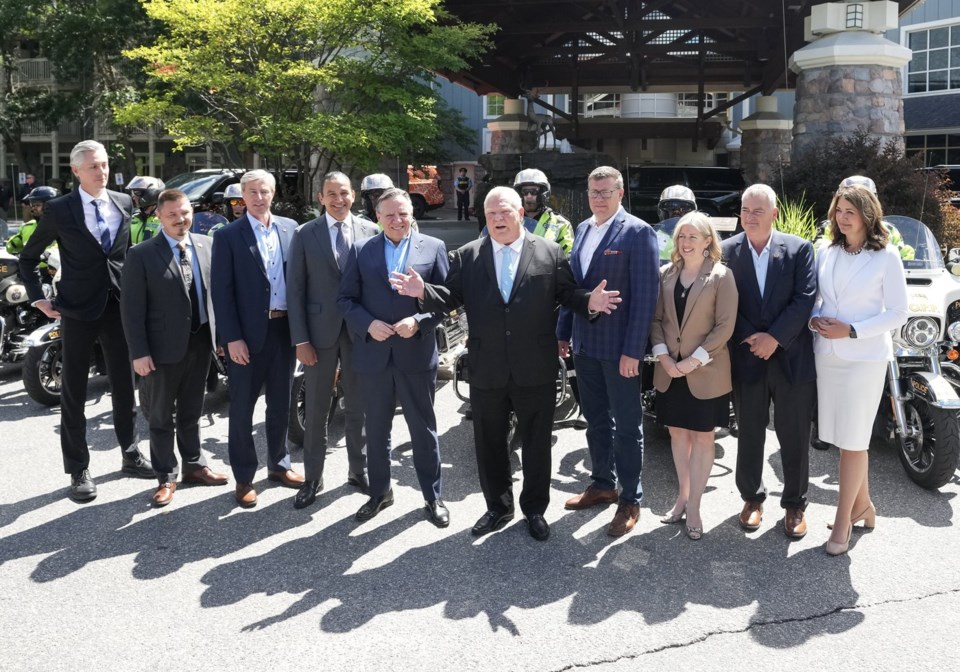HUNTSVILLE, ONT. — Canada's premiers pledged economic reconciliation with Indigenous people through major infrastructure and resource projects at their semi-annual meeting that began Monday, though several First Nation leaders said afterward they were disappointed with the discussion.
The premiers gathered at Deerhurst Resort in Huntsville, Ont., to talk trade and tariffs, particularly when they meet Tuesday with Prime Minister Mark Carney.
But first they held a meeting with leaders from First Nations that included the Assembly of First Nations, Anishinabek Nation and the Native Women's Association of Canada, among other Indigenous groups.
Assembly of First Nations National Chief Cindy Woodhouse Nepinak struck a positive tone after the meeting, where the premiers agreed to meet with Indigenous leadership and the prime minister, though First Nations were not invited to the meeting with Carney.
"I consider this progress," she said.
"I'm glad the premiers had agreed that we do have to have a couple discussions with each other. They're not always going to be easy, but it's so important that we all work together and sit at the same table."
The meeting comes as Indigenous communities have expressed concerns about federal and provincial laws meant to fast-track major infrastructure projects as a way to stimulate the economy facing tariff impacts.
Both Ontario Premier Doug Ford and Carney are looking to mine the Ring of Fire in northwestern Ontario, which is said to be replete with critical minerals. The prime minister is considering major projects pitched by the premiers and the Ring of Fire is among Ford's top priorities. But many Ontario First Nations are not on board, saying their concerns are being ignored.
Two new laws aimed at stimulating the economy have sparked outrage from many First Nations that want meaningful consultation on major projects in their territories.
The federal law known as Bill C-5 allows cabinet to quickly grant federal approvals for big projects deemed to be in the national interest by sidestepping existing laws, while Ontario's Bill 5 allows its cabinet to suspend provincial and municipal laws through the creation of so-called "special economic zones."
Nine Ontario First Nations have filed a court challenge to the laws.
Carney hosted a meeting with hundreds of First Nations chiefs last week, and while some chiefs walked out saying they saw an insufficient response to concerns they'd been raising for weeks, others left the meeting "cautiously optimistic."
Alberta Premier Danielle Smith said the lengthy regulatory approval process for pipelines and mineral extraction has been a problem and she believes governments can shorten that time frame while also consulting with First Nations.
"I think in this new world that we're in, we have to figure out a way to get to 'yes' faster. It doesn't mean that there isn't a robust consultation that has to happen, but it has to happen in a time frame where a proponent is going to know that the answer is yes and how we get there," she said.
"We think this is a great opportunity for economic reconciliation with First Nations."
Ford said he wants to move fast on big projects, but that stance softened somewhat after the meeting.
"We have 133 First Nations communities, and everyone's a little different, but the ones that want to be progressive move quick, and we'll move quick," he said.
"Ones that want a little more consultation, that's fine, too. We just want to work together, and everyone's going to prosper."
He said the province "can't move forward without their collaboration and their buy-in."
Anishinabek First Nation Grand Council Chief Linda Debassige called it a "short meeting" where little was accomplished.
"It was a lost opportunity in not being able to talk about challenges where we can work through those together," said Debassige, whose organization represents 39 First Nations in northern and southern Ontario.
"It was the provinces sharing the good news stories, but not delving into the conversations we need to have around the challenges we face and look at potential ways for solutions."
Grand Chief Alvin Fiddler of Nishnawbe Aski Nation said he was "disheartened" by the meeting. He said major issues like the governments' duty to consult First Nations and treaty rights were not discussed.
And he was also disappointed that First Nations were not invited to Tuesday's meeting with the premiers and the prime minister.
"They're going to be talking about our land, our resources, our rights and we're not going to be there," Fiddler said.
The premiers were off to a dinner at Ford's cottage, where the prime minister was expected to join them.
This report by The Canadian Press was first published July 21, 2025.
Liam Casey and Allison Jones, The Canadian Press




